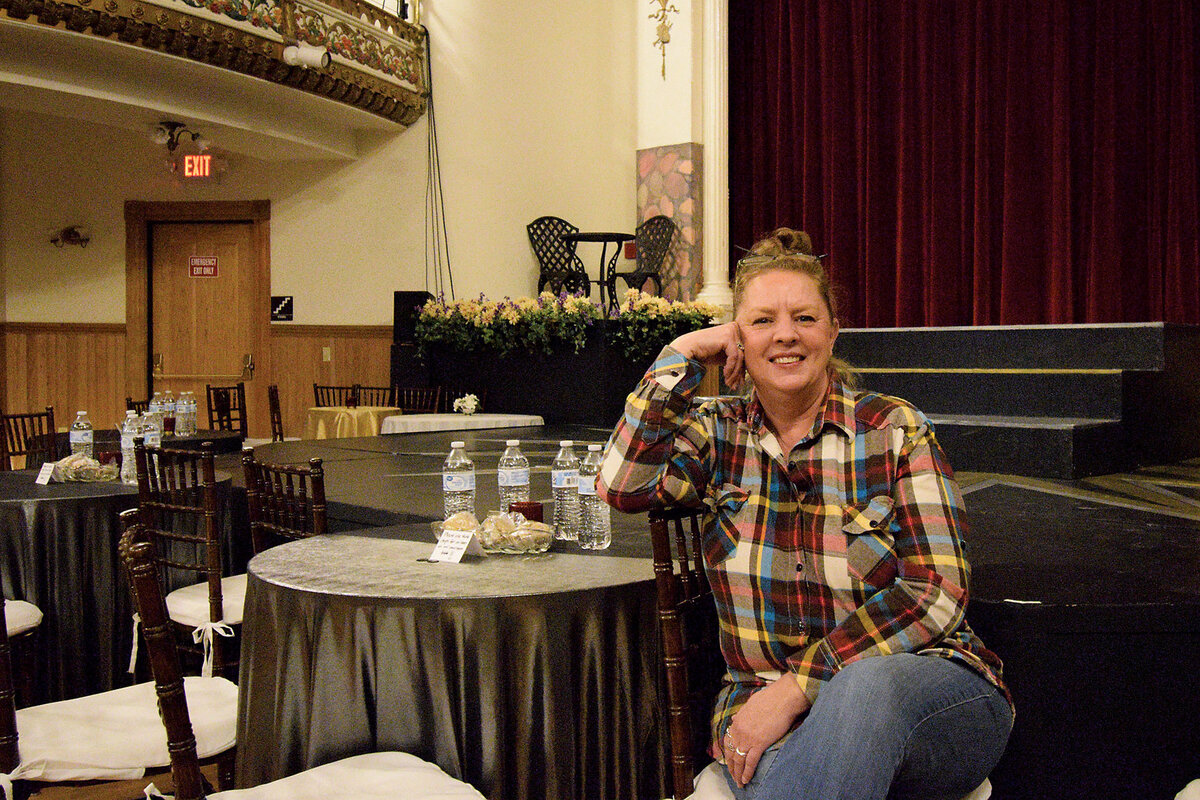A small town, public art, and the First Amendment
Loading...
| Littleton, N.H.
In front of the library on Main Street in this northern New Hampshire town is a bronze Pollyanna statue, smiling with her arms flung wide. Pollyanna’s carefree days may be numbered. If the residents of Littleton vote to limit public art, as one Board of Selectmen member has suggested, the statue will have to be removed. There’s no middle ground: Either all art or none would be allowed on government property.
There’s no particular objection to Pollyanna herself. A few blocks away are the three paintings that sparked the debate over whether to limit public art. Tucked just off Main Street on the side of a building are three boarded-up windows – now painted with nature scenes. The project was sponsored by a local organization, North Country Pride. Fearing future art with overt LGBTQ+ themes, one member of the three-person select board raised objections to the painted panels late last summer, sparking a debate that has dragged on.
Disagreements over content, whether in art or in books, have been occurring across the United States, often resulting in bans covering school systems and libraries. In New Hampshire, what qualifies as art and the appropriateness of certain art have arisen in challenges to a lobster painting in Merrimack, a mural of baked goods in Conway, and the three panels in Littleton.
Why We Wrote This
A story focused onWould no public art be better than art someone found objectionable? In New Hampshire, a town has been roiled for months over that question.
Art is protected by the First Amendment just as speech is, so censoring public art wouldn’t hold up, says Ken Paulson, director of the Free Speech Center at Middle Tennessee State University. Cities have one tool to control the appearance of public buildings, and that’s zoning. And while the government can decide what goes on its own buildings, it can’t outlaw art on private buildings or discriminate against ideas.
“What we’re seeing nationwide is a pattern of legislators and city council members suddenly believing they have a license to regulate what people read or see,” says Mr. Paulson. “So much of what’s going on now would have been unthinkable for decades. In many ways, it’s 1957 again in America.”
Littleton, a town of about 6,000 people, has a vibrant Main Street with local businesses, a music festival in the summer, and skiing in the winter. Unlike that of many small towns, the population is growing younger. Most residents shake their heads at the suggestion of limiting public art, particularly in the “Live Free or Die” state. Some suggest the crux of the issue is really a newcomer-versus-old-guard clash.
Selectwoman Carrie Gendreau, also a state senator, raised the objections to the murals. She has stated that many of her political views stem from her Christian faith, and used the word “demonic” to describe one of the panels in an interview with The Boston Globe. She did not respond to requests for comment.
The debate also reached the town’s theater, housed in a historic opera building on Main Street. Jim Gleason, the town’s manager until recently, says he heard objections from a handful of people to Theatre UP’s fall production, “La Cage aux Folles,” whose two main characters are gay. His response, he said in an in-person interview in late 2023, was that just as the theater is free to choose its plays, Littleton citizens are free to boycott the performances or protest from the street.
There were no protesters outside the opera house during any of the shows, according to Lynne Grigelevich, executive director of Theatre UP.
Some of the comments Mr. Gleason heard at the time took a personal turn. A woman who objected to the theater’s production told him she hoped his son was “in hell.” Mr. Gleason’s son, who died in 2016, was gay. “I wish this issue hadn’t come up and created the divide that it has in the community,” he says.
Mr. Gleason announced his resignation as town manager, effective Feb. 2, at a January meeting of the Littleton Board of Selectmen. Several days later, he told a local paper, he received an envelope containing a photo of himself with a homophobic slur written across it.
Local business owners and sisters Jessica and Rose Goldblatt were surprised by the objection to the art and the suggestion of a ban. Jessica recalled the case of a lighted cross on the mountain above the town in the 1980s, a symbol that was moved off public land. Now, faced with a new conversation about art, she says some of it may be due to changing dynamics within the community. “There’s a lot of young energy happening here,” she says, adding that she understands that for some longtime residents, it may feel like, “What’s happening to our town?”
Some of these changes are par for the course in the U.S., says Mr. Paulson.
“The impulse has always been there for the majority to protect its own culture and look askance at that of others,” he says. “The difference today is we live in the most diverse America ever, and those diverse communities are no longer willing to be silenced.”
A Littleton town meeting in September, available online, drew an estimated 300 people. It was far more than most residents could ever remember. One man, who introduced himself as Matthew Simon, used the public comment period to defend Ms. Gendreau. She “has served faithfully in this position, and she’s served and loved the members of this community with the same beliefs that she spoke of recently that many people share,” he said. He was met with shouts of objection when he said
Littleton residents had “tolerated” pride flags flying in the town.
“She speaks for the silent majority,” another commenter, Nick De Mayo, a Republican Party leader from Sugar Hill, said to mixed boos and applause. “Not only is Littleton a hub of this area; it’s also a religious hub of this area.”
Most people who spoke, however, agreed with Franco Rossi.
Mr. Rossi, who used to serve on the select board alongside Ms. Gendreau, said at the meeting he understands how difficult the job of town governance is, but that he can’t condone her actions.
“You certainly have the right to have your opinions and say what you want, but I don’t think you’re understanding what damage that does to a community that’s been marginalized for so long, that’s always been viewed as unequal,” he said.
Before he resigned, Mr. Gleason told the Monitor it was unlikely that a measure limiting public art would appear on the town warrant in the spring. That’s particularly true since the other two members of the select board have said they don’t support it. At the meeting where Mr. Gleason resigned, he suggested that the board may still ask the public to eventually weigh in on rules around art.
Tensions have extended to other areas of the community. “We were basically told that the entire Board of Selectmen did not agree with the LGBT lifestyle” in an October meeting, says Ms. Grigelevich, straining relationships between Theatre UP and the board. “Sometimes you’ve got to walk through the ugliness. ... I do think that much good will come of this.”
The controversy may ultimately have the opposite effect, says Kerri Harrington, a founder of North Country Pride. “People are saying, ‘Let’s do more art,’” she says.
That fits with her view of New Hampshire: “a libertarian stronghold,” “the state where you can go to try things out.” Mr. Gleason’s treatment, Ms. Harrington says in a January text message, has been disheartening.
The controversy could serve as a positive force for change, says Gregory Covell, a lifelong resident and an antique store co-owner. In fact, he says, it’s already bringing together a town that is becoming more diverse and younger.
“[Some people] still think it’s Mayberry, and that Sheriff Andy will solve everything, and it’s not,” he says. Littleton isn’t exempt from the complications facing the rest of the world, he adds, and “the leaders of the town aren’t sure how to respond to that. They’ve never been challenged like this.”








